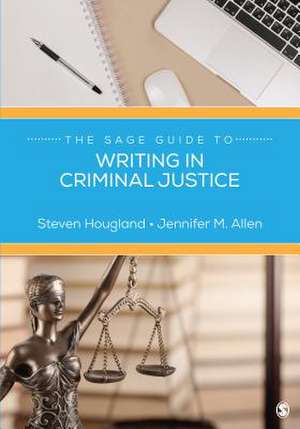The SAGE Guide to Writing in Criminal Justice: The SAGE Guide to Writing in the Social Sciences
Autor Steven Hougland, Jennifer M. Allenen Limba Engleză Electronic book text – 11 mar 2019
Preț: 177.68 lei
Nou
Puncte Express: 267
Preț estimativ în valută:
30.00€ • 30.99$ • 24.97£
30.00€ • 30.99$ • 24.97£
Indisponibil temporar
Doresc să fiu notificat când acest titlu va fi disponibil:
Se trimite...
Preluare comenzi: 021 569.72.76
Specificații
ISBN-13: 9781544360720
ISBN-10: 154436072X
Pagini: 136
Ediția:First Edition
Editura: SAGE Publications
Colecția Sage Publications, Inc
Seria The SAGE Guide to Writing in the Social Sciences
Locul publicării:Thousand Oaks, United States
ISBN-10: 154436072X
Pagini: 136
Ediția:First Edition
Editura: SAGE Publications
Colecția Sage Publications, Inc
Seria The SAGE Guide to Writing in the Social Sciences
Locul publicării:Thousand Oaks, United States
Recenzii
“TheSAGE
Guide
to
Writing
in
Criminal
Justiceprovides
students
studying
crime
with
a
“how-to”
manual
for
effective
writing
in
institutions
of
higher
learning,
professional
settings,
public
and
private
agencies,
and
beyond.
It
is
an
easy,
accessible
resource
for
anyone
hoping
to
learn
the
nuts
and
bolts
of
writing
for
criminal
justice
audiences.”
“This is my new textbook for my ‘Professional Writing in Criminal Justice’ course!...This is the book that I have been looking for, and I am SO glad to see if come to fruition! Kudos to the authors!”
“It’s a good guide for students who want to improve their writing and refresh some of the lessons learned in writing classes.”
“This is an applied text to build skills in writing. Period. And that is great!”
“Inexpensive. A valuable tool for students and a time saving addition to every course. A resource students can use throughout their academic tenure.”
“A nice point of reference for students who wish/need to improve their writing abilities, and who want to be better prepared for the after-University.”
“This brief writing guide provides criminal justice students straightforward descriptions of basic report writing as well as college paper writing. The text provides helpful examples and puts into context the importance of writing well.”
“This is my new textbook for my ‘Professional Writing in Criminal Justice’ course!...This is the book that I have been looking for, and I am SO glad to see if come to fruition! Kudos to the authors!”
“It’s a good guide for students who want to improve their writing and refresh some of the lessons learned in writing classes.”
“This is an applied text to build skills in writing. Period. And that is great!”
“Inexpensive. A valuable tool for students and a time saving addition to every course. A resource students can use throughout their academic tenure.”
“A nice point of reference for students who wish/need to improve their writing abilities, and who want to be better prepared for the after-University.”
“This brief writing guide provides criminal justice students straightforward descriptions of basic report writing as well as college paper writing. The text provides helpful examples and puts into context the importance of writing well.”
Cuprins
Preface
Acknowledgments
About the Authors
Chapter 1: The Basics of Writing
Basic Grammar Rules
Critical Thinking Skills, Academic Writing, and Professional Writing
Writing for Criminal Justice Professions
Policing Reports
Corrections Reports
Probation/Parole Reports
Court Reports
Chapter 2: What Is Information Literacy?
Information Literacy
Digital Literacy, Computer Literacy, and Technology Literacy Skills
Chapter 3: Writing in Criminal Justice
Basic Writing Tools
Field Notes
Point of View
Writing the Narrative
Writing Styles
Examples of Poorly Written Incident Reports
The SAGE Way
Eliminate Slang and Jargon
Eliminate Emotion
Answer the Interrogatives
Editing
Chapter 4: Other Documents: Memos, Letters, Emails, Cover Letters, and Resumes
Writing Business-Related Documents
Memos
Letters
Emails
Cover Letters and Resumes
Chapter 5: Academic Paper Formats: What Is APA Formatting?
Research, Publication, and the APA Style Rules
APA Formatting and Ethical and Legal Standards
Modern Language Association and the Chicago Manual of Style
Chapter 6: The Academic Research Paper
The Research Writing Process
Conducting Research
Locating Sources
Google Scholar
Use Country Codes
Use Databases
Evaluating Sources
How to Read a Scholarly Article
Writing a Literature Review
Writing the Essay
Working and Annotated Bibliographies
Appendix: Sample Student Essay
References
Acknowledgments
About the Authors
Chapter 1: The Basics of Writing
Basic Grammar Rules
Critical Thinking Skills, Academic Writing, and Professional Writing
Writing for Criminal Justice Professions
Policing Reports
Corrections Reports
Probation/Parole Reports
Court Reports
Chapter 2: What Is Information Literacy?
Information Literacy
Digital Literacy, Computer Literacy, and Technology Literacy Skills
Chapter 3: Writing in Criminal Justice
Basic Writing Tools
Field Notes
Point of View
Writing the Narrative
Writing Styles
Examples of Poorly Written Incident Reports
The SAGE Way
Eliminate Slang and Jargon
Eliminate Emotion
Answer the Interrogatives
Editing
Chapter 4: Other Documents: Memos, Letters, Emails, Cover Letters, and Resumes
Writing Business-Related Documents
Memos
Letters
Emails
Cover Letters and Resumes
Chapter 5: Academic Paper Formats: What Is APA Formatting?
Research, Publication, and the APA Style Rules
APA Formatting and Ethical and Legal Standards
Modern Language Association and the Chicago Manual of Style
Chapter 6: The Academic Research Paper
The Research Writing Process
Conducting Research
Locating Sources
Google Scholar
Use Country Codes
Use Databases
Evaluating Sources
How to Read a Scholarly Article
Writing a Literature Review
Writing the Essay
Working and Annotated Bibliographies
Appendix: Sample Student Essay
References
Descriere
TheSAGE
Guide
to
Writing
in
Criminal
Justiceequips
you
with
transferable
writing
skills
that
can
be
applied
across
the
field
of
criminal
justice—both
academically
and
professionally.
Authors
Steven
Hougland
and
Jennifer
M.
Allen
interweave
professional
and
applied
writing,
academic
writing,
and
information
literacy,
with
the
result
being
a
stronger,
more
confident
report
writer
and
student
in
criminal
justice.
You
are
also
exposed
to
a
number
of
best
practices
for
academic
and
professional
writing,
such
as
research
papers,
resumes
and
cover
letters,
and
report
writing. The
perfect
companion
for
any
introductory
criminal
justice
course,
this
brief
text
focuses
on
key
topics
that
will
benefit
you
in
your
classes
and
in
the
field.



